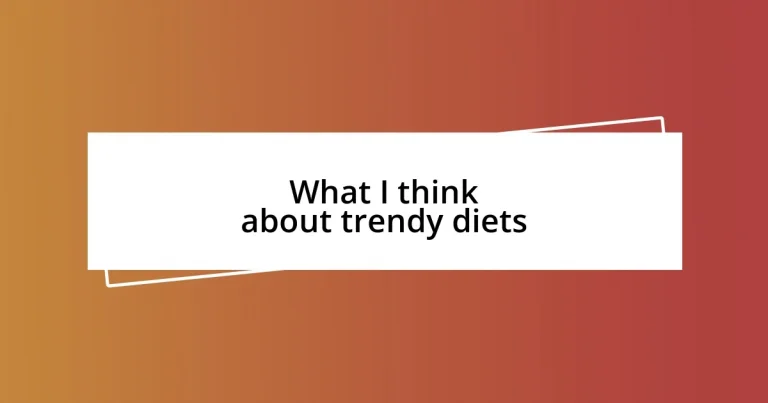Key takeaways:
- Trendy diets often promise quick results, but individual needs and emotional connections to food should guide our dietary choices for sustainable health.
- Each popular diet has unique benefits and challenges, highlighting the importance of finding a balanced approach that suits personal lifestyles rather than adhering strictly to fads.
- Successful dietary strategies involve understanding personal preferences, seeking flexibility, and cultivating a positive relationship with food, rather than succumbing to social pressures and rigid rules.
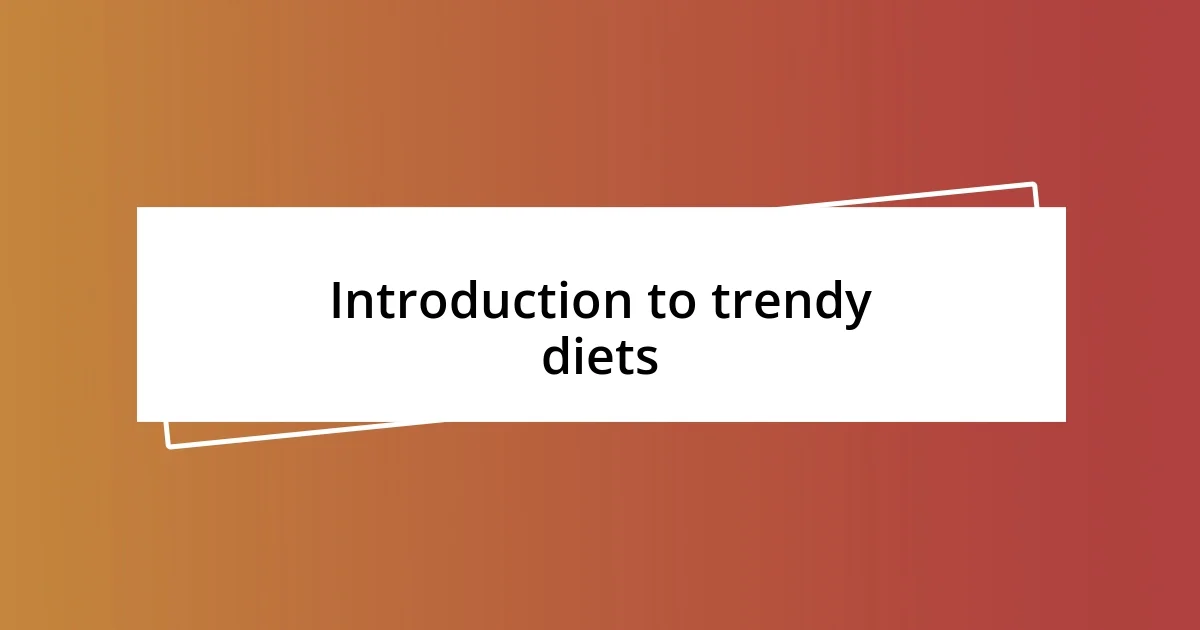
Introduction to trendy diets
Trendy diets have become the talk of the town, capturing the attention of health enthusiasts and casual eaters alike. I remember the excitement of trying the popular keto diet after hearing friends rave about their weight loss seemingly overnight. But with every new diet fad, I found myself wondering—what truly drives this obsession with the latest eating trend?
These diets promise quick fixes, making us believe that a simple switch in what we eat can lead to miraculous transformations. Yet, as I learned from my own experiences, such promises often leave me feeling more confused than fulfilled. It’s like jumping from one diet to another, desperately seeking that elusive ‘perfect’ plan without pausing to consider what my body genuinely needs.
What intrigues me most is the emotional journey that accompanies these dietary trends. Have you ever felt that rush of hope when starting something new, only to be met with disappointment? I certainly have. Most of these trendy diets gain traction not just for their promises of weight loss, but because they tap into deeper feelings of self-worth, belonging, and the desire for control over our lives. Understanding this emotional connection could be the key to making better, lasting choices about our health.
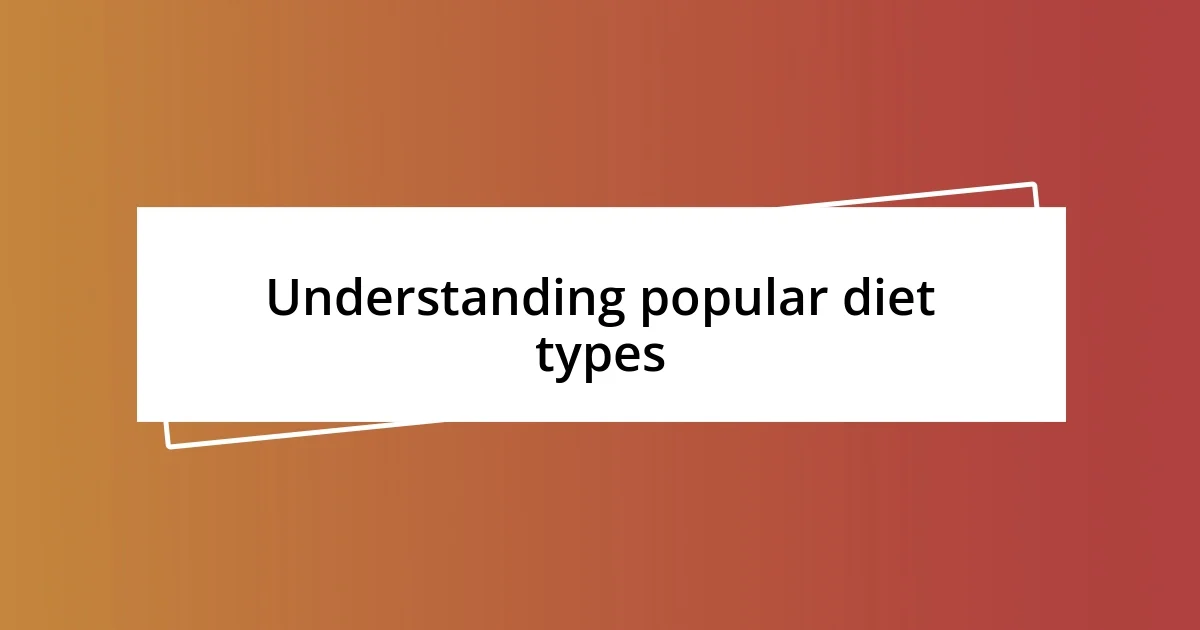
Understanding popular diet types
When looking at the landscape of popular diet types, it’s fascinating how each one presents itself with unique philosophies and promised benefits. I’ve tried various diets, and while some worked temporarily, I often found myself back where I started, especially with restrictive options like the Paleo diet. The allure of these diets often lies in their strictness, making me think, “If I just follow this to the letter, I’ll finally succeed.” But in reality, it’s more about finding a balance that suits my lifestyle and preferences.
Here’s a quick breakdown of some trendy dieting approaches:
– Keto: Emphasizes high fat and very low carbs, aiming to shift the body into a state of ketosis for fat burning.
– Intermittent Fasting: Focuses on when to eat rather than what to eat, cycling between periods of eating and fasting.
– Plant-Based: Centers on consuming primarily plants—fruits, vegetables, grains, and nuts—often for ethical and health reasons.
– DASH (Dietary Approaches to Stop Hypertension): Aims to reduce blood pressure through a diet rich in fruits, vegetables, whole grains, and lean proteins.
– Mediterranean: Inspired by traditional eating habits from Mediterranean countries, it emphasizes healthy fats, whole grains, and lean proteins for overall wellness.
Understanding these diets helps highlight their individual benefits and challenges. Personally, I realized that for sustainable change, it’s crucial to choose one that feels manageable and enjoyable, rather than getting swept up in the latest craze.
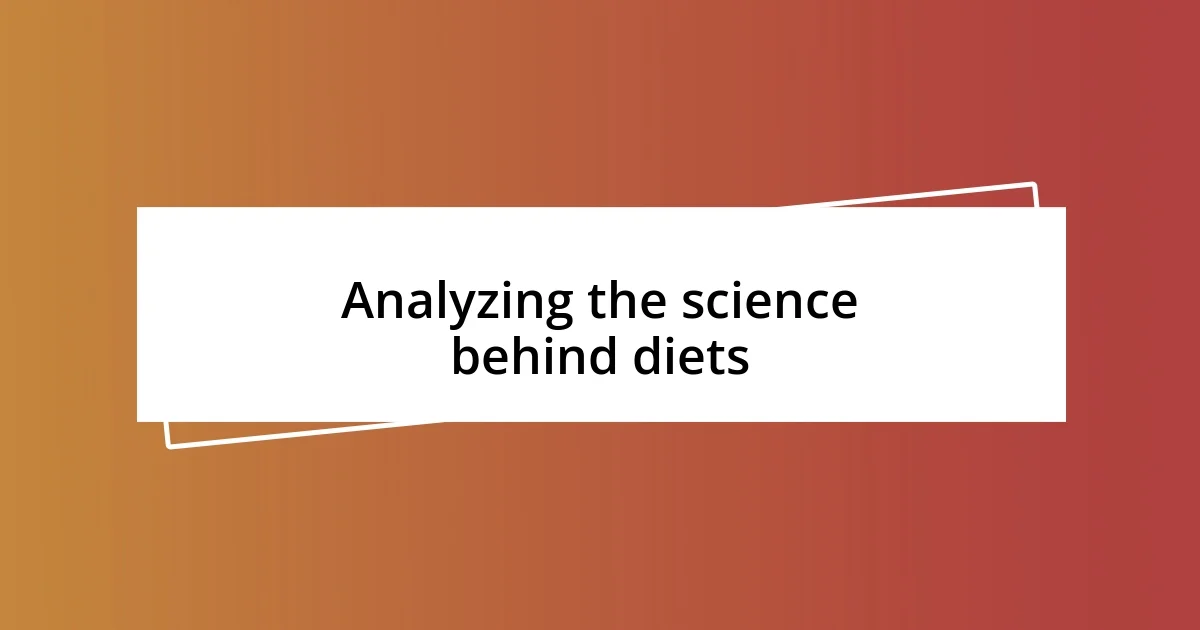
Analyzing the science behind diets
Analyzing the science behind popular diets is both intriguing and complex. I recall my initial embrace of the Mediterranean diet; its reputation for heart health caught my attention. Yet, diving deeper into the research revealed that while it champions whole foods and healthy fats, individual experiences vary. What works wonders for one person might not resonate the same way for another. This variability is key to understanding why some diets thrive while others fade away.
The science behind diets often draws on nutrition and metabolism, yet there’s a psychological component too. When I jumped into intermittent fasting, I felt a surge of empowerment over my eating schedule. However, I later learned that the science supports its effectiveness largely due to reduced calorie intake, not just a magical fasting window. My experience taught me that any diet must also consider personal lifestyle factors and preferences to truly succeed.
In essence, rigorous science meets personal experience in the world of trendy diets. I think it’s essential to realize that while certain diets boast compelling research, our individual reactions to them can vary dramatically. Each body responds differently, underscoring the importance of a tailored approach to any diet.
| Diet Type | Key Focus |
|---|---|
| Keto | High-fat, low-carb for ketosis |
| Intermittent Fasting | Eating schedule, not specific foods |
| Plant-Based | Primarily fruits, vegetables, and grains |
| DASH | Reducing blood pressure through healthy foods |
| Mediterranean | Healthy fats, whole grains, and proteins |
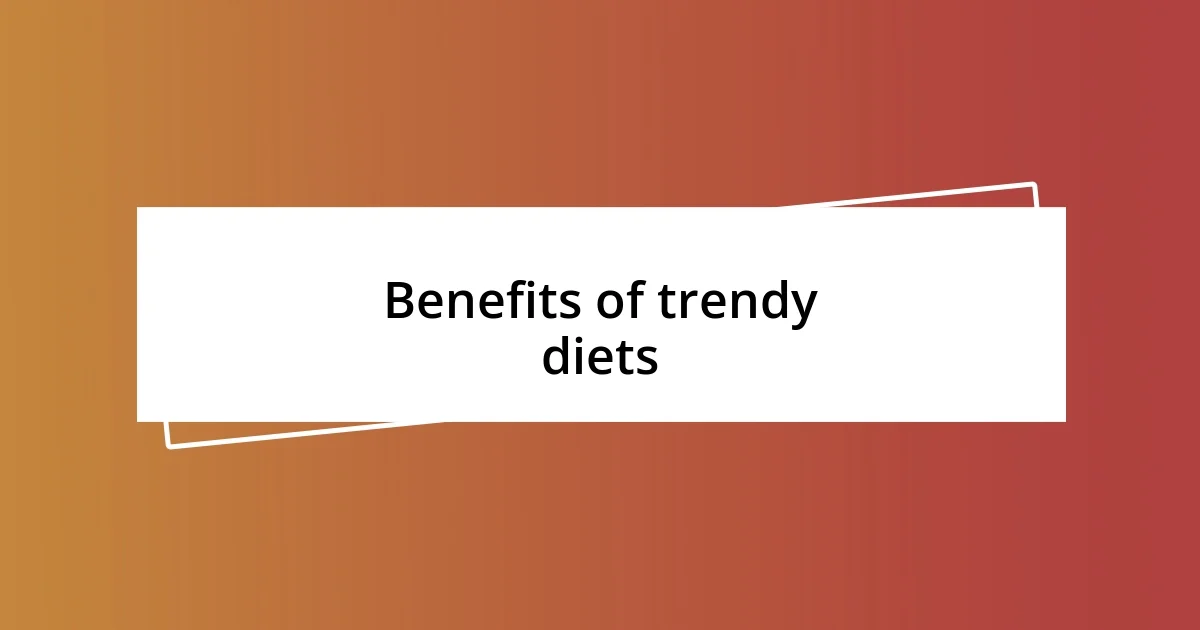
Benefits of trendy diets
Trendy diets can offer a fresh perspective on eating habits that sometimes revitalizes our relationship with food. I remember starting a plant-based diet and feeling a wave of enthusiasm as I explored a myriad of vibrant vegetables and spices. It was like discovering a whole new world of flavors that left me energized and excited about meal prep. Have you ever felt that connection to food when trying something new? That’s one of the benefits—finding joy in cooking and tasting can make healthy eating feel less like a chore.
Moreover, adopting a trendy diet can also lead to an increased awareness of nutritional choices. When I dived into the Mediterranean diet, I found myself scrutinizing labels and choosing whole foods over processed options. This shift didn’t just benefit my body; it also heightened my empathy towards my overall health journey. It’s interesting how the simple act of being mindful about food can encourage better habits, fostering a sense of control and accomplishment.
Importantly, trendy diets often come with a built-in support community, whether online or locally, which can significantly boost motivation. I joined a social media group focused on intermittent fasting, and it was incredible to share experiences, tips, and even struggles with others going through the same journey. The sense of camaraderie reminded me that I’m not alone in navigating these dietary trends. It’s fascinating how a shared goal can make the process feel more manageable and even enjoyable!
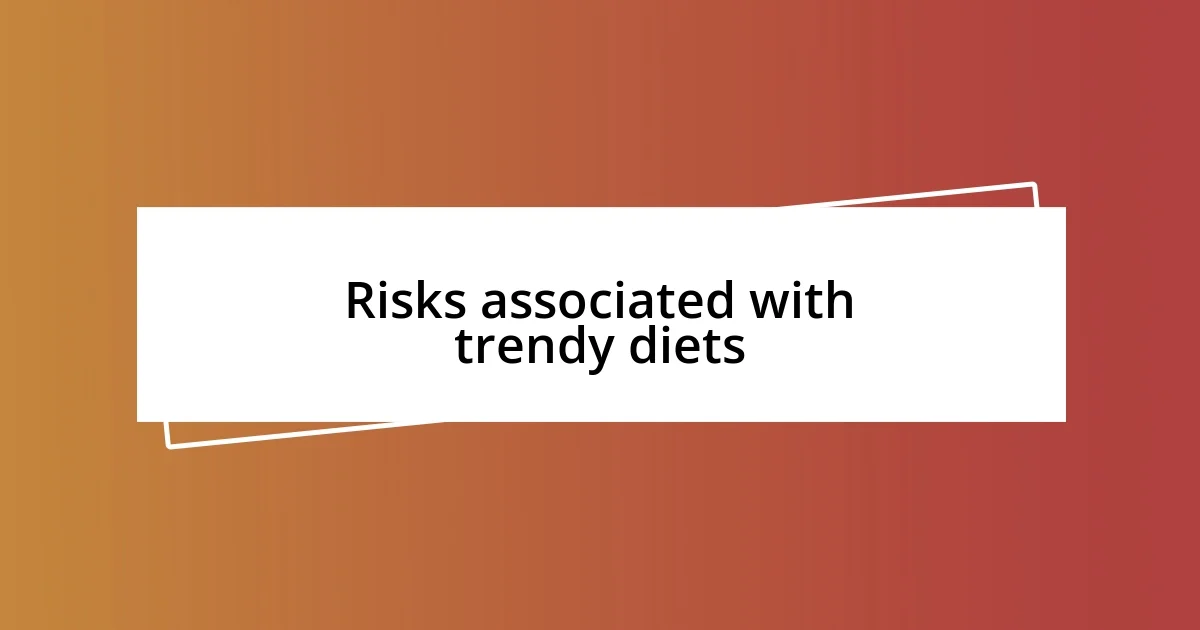
Risks associated with trendy diets
Taking the leap into trendy diets can come with its own set of risks, and I’ve seen this firsthand. For example, when I experimented with the keto diet, I initially loved the idea of rapid weight loss. However, I quickly learned about the dreaded “keto flu” — those fatigue and headaches during the body’s transition to ketosis weren’t exactly what I had in mind for a health journey. Has anyone else felt that unexpected slump while trying to embrace a new lifestyle? It can certainly ruin your enthusiasm for a fresh approach.
Another major concern is the potential for nutrient deficiencies. I remember meeting someone who strictly adhered to a plant-based diet without proper planning. While their intentions were admirable, they struggled with energy levels due to low iron and vitamin B12. It really drove home the point for me that even the most popular diets need a thoughtful strategy to be effective and safe. This raises an important question: How can we ensure that in pursuing something trendy, we don’t overlook the basics of balanced nutrition?
Finally, the social pressures that can wrap around trendy diets often add a layer of stress that can be counterproductive. My own experience with intermittent fasting introduced me to a strict eating schedule that, while beneficial, sometimes clashed with social events. I can’t count the times I politely declined meals with friends, feeling a twinge of guilt for not participating. Isn’t it interesting how our well-intentioned choices can sometimes lead to isolation? It’s a reminder that while trendy diets can be appealing, the risks often lie in their influence on our social lives and mental well-being.
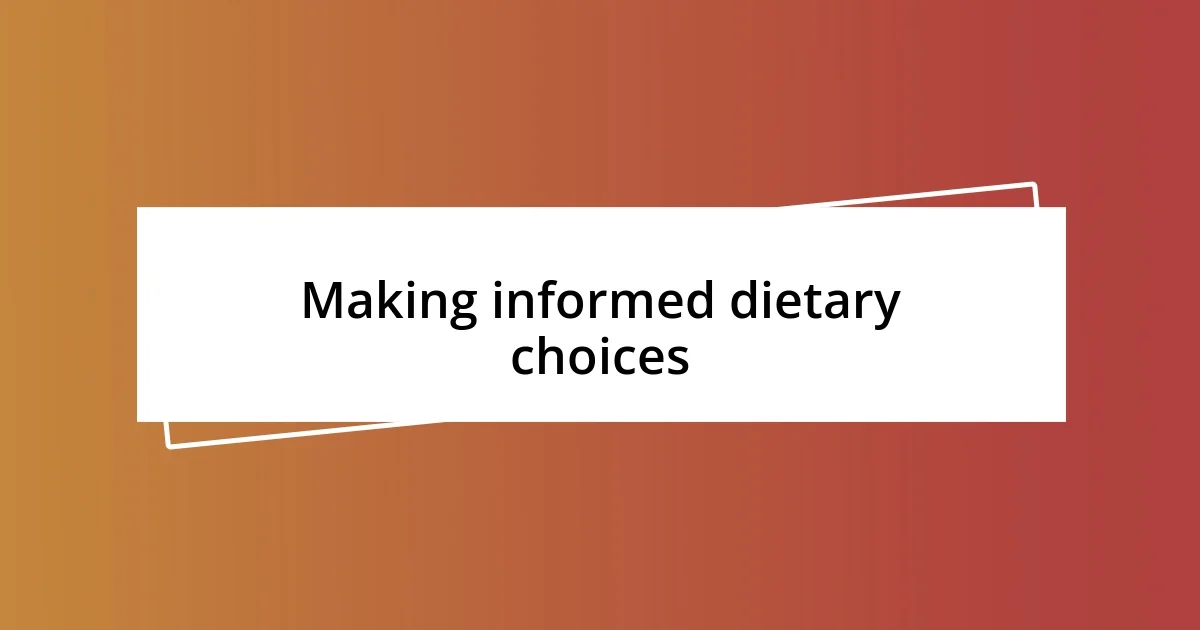
Making informed dietary choices
Making informed dietary choices is essential in today’s fast-paced world full of trendy diets. I often find myself reflecting on how much research I put into what I eat. For instance, when I considered trying a gluten-free diet, I didn’t just jump in; I explored the reasons behind it, consulted nutrition articles, and even chatted with a dietitian. This process helped me distinguish between a fad and something that could genuinely improve my well-being.
One key aspect I’m mindful of is understanding my body’s specific needs. I have friends who thrive on high-protein diets, but personally, I felt sluggish when I tried to follow suit. Moving from what everyone else is doing to listening to my intuition showed me that our bodies are unique. Have you ever noticed how what works for one person may not work for you? That unforgettable lesson sparked my journey to becoming more attuned to what fuels me.
Additionally, I’ve come to appreciate the importance of flexibility in making dietary choices. There was a time I felt bound by strict rules, which only led to frustration and guilt. Embracing a more fluid approach has allowed me to enjoy food without the stress of perfectly adhering to a rigid diet. Isn’t it liberating to know we can enjoy the benefits of trendy eating without turning it into a stressful checklist? Finding balance in my dietary choices has been a game changer for my overall health and happiness.
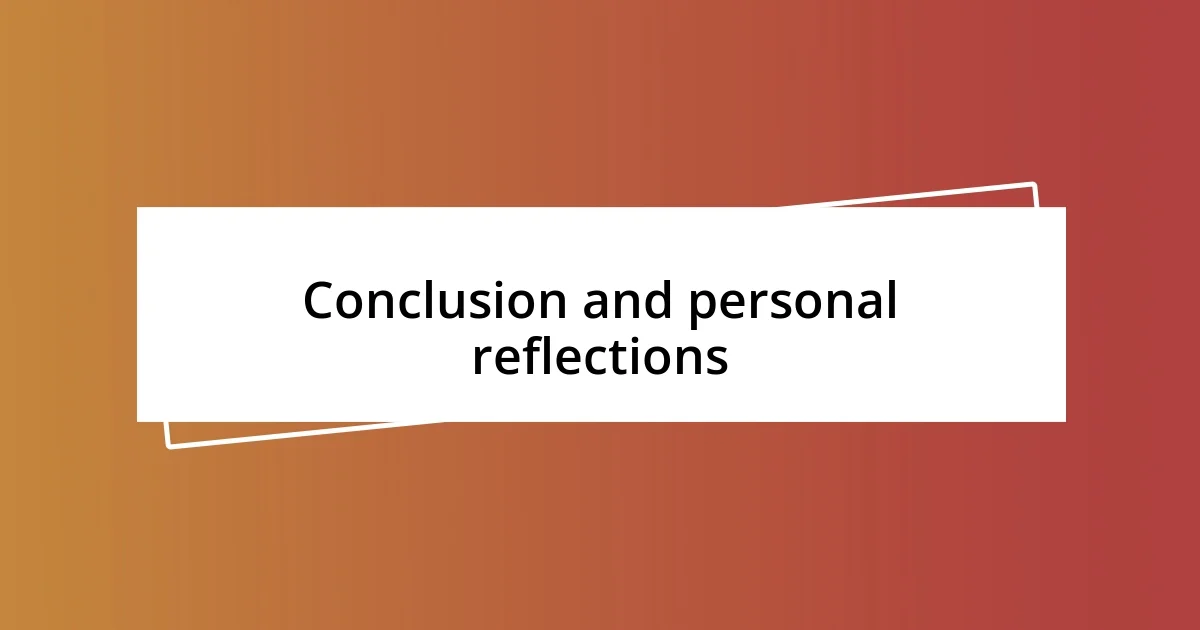
Conclusion and personal reflections
Reflecting on my experiences with trendy diets, I’ve come to realize that these approaches often promise quick results but frequently overlook individual needs. For instance, after trying a detox cleanse that left me feeling drained and deprived, I learned the hard way that our bodies thrive on nourishment, not starvation. Have you ever felt that clash between the hype around a diet and your own body’s signals? It’s a tough lesson, but it’s taught me to prioritize listening to my instincts over the latest buzz.
In my journey, I’ve also recognized how emotional ties to food can complicate trendy diets. There was a time when I felt pressured to follow a low-carb regimen, only to find that sharing pasta nights with loved ones became a bittersweet memory. Instead of thriving, I found myself craving connection rather than a restrictive diet. Isn’t it interesting how our relationship with food can shape our experiences? I believe that fostering joy around meals can lead to better choices than adhering to strict, trendy rules.
Ultimately, trendy diets have their place but may not lead to a sustainable lifestyle for everyone. Through my trial and error, it’s become clear to me that honoring my body and nourishing my spirit holds greater value than chasing the next fad. By focusing on balanced nutrition and genuine well-being, I feel empowered. Isn’t that the goal for all of us—finding a way to feel our best, regardless of what’s trending?












